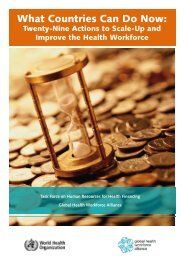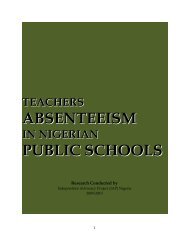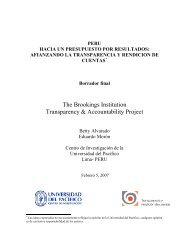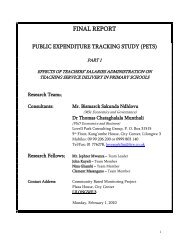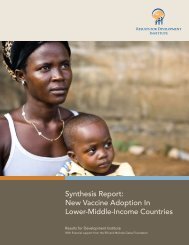Provider Purchasing and Contracting for Health Services_The Case
Provider Purchasing and Contracting for Health Services_The Case
Provider Purchasing and Contracting for Health Services_The Case
Create successful ePaper yourself
Turn your PDF publications into a flip-book with our unique Google optimized e-Paper software.
clearly specified the obligations of each party to the agreement. <strong>The</strong>se <strong>for</strong>med the basis <strong>for</strong><br />
evaluation of per<strong>for</strong>mance by the district. Further, the provider undertook to produce<br />
quarterly reports <strong>and</strong> an annual report indicating progress made toward the set targets in the<br />
action plan. <strong>The</strong> Central Board of <strong>Health</strong> made two types of assessment every quarter: First,<br />
the board conducted per<strong>for</strong>mance assessments to determine whether contractees were<br />
achieving set targets in the action plans. Second, the board conducted technical assessments<br />
to determine whether providers had the technical capacity to per<strong>for</strong>m the required tasks.<br />
Based on the identified needs, the Central Board of <strong>Health</strong> provided technical assistance to<br />
poorly per<strong>for</strong>ming districts instead of applying sanctions.<br />
Financial assessments<br />
<strong>The</strong> allocation <strong>for</strong> each item of the budget continue to be specified as a fixed proportion of<br />
the total budget allocation, <strong>and</strong> the hospitals are not allowed to reallocate funds across lines in<br />
the stipulated budget according to guidelines. Penalties are stipulated in the contracts with the<br />
Ministry of <strong>Health</strong> <strong>and</strong> the Central Board of <strong>Health</strong> <strong>for</strong> deviations from targets. <strong>The</strong> budgets<br />
are to cover expenses <strong>for</strong> water, electricity, telephone, cleaning, patient food, fuel, allowances<br />
to health care staff, <strong>and</strong> a small proportion of drugs. <strong>The</strong> purchaser has the right to withdraw<br />
funding if the provider failed to provide satisfactory financial <strong>and</strong> or progress reporting.<br />
Human resources<br />
<strong>The</strong> National <strong>Health</strong> <strong>Services</strong> Act of 1995 empowered boards to hire staff <strong>and</strong> to motivate<br />
staff members to improve health outcomes. Although the boards hired staff on a contractual<br />
basis, there was no commensurate increase in funding from the Ministry of <strong>Health</strong>. This<br />
resulted in huge wage bills that could be settled only by reducing operations grants to service<br />
providers. <strong>The</strong> boards could not service the gratuities when they fell due, resulting in boards<br />
accruing huge debts. This made the de-linkage of staff from the Public Service Commission<br />
politically difficult. Thus, the government covered salaries (but not allowances) <strong>for</strong> health<br />
care personnel. <strong>The</strong>se were paid <strong>for</strong> directly by the Ministry of <strong>Health</strong>. 6<br />
Pharmaceutical supply chain investment<br />
<strong>The</strong> supply <strong>and</strong> management of drugs is operated by the autonomous state-owned Medical<br />
Stores Limited (MSL). It was set up in 1976 with a m<strong>and</strong>ate to procure, store, <strong>and</strong> distribute<br />
pharmaceutical <strong>and</strong> medical supplies on behalf of the Ministry of <strong>Health</strong>. However, the<br />
procurement function was taken over by the ministry <strong>and</strong> placed under its Procurement <strong>and</strong><br />
Supply Unit. By the mid-1990s, MSL experienced some difficulties in providing the expected<br />
services. As a result, the management of MSL was contracted out to a private <strong>for</strong>-profit<br />
company in 1998 through a competitive bid which was won by GRM. After the contract with<br />
GRM expired in 2004, the contract was re-tendered <strong>and</strong> awarded to Crown Agents, a<br />
company incorporated in Engl<strong>and</strong> <strong>and</strong> Wales with a branch in Zambia, <strong>and</strong> it has remained<br />
the contractor since then. Under the contract, the Ministry of <strong>Health</strong> pays all operational <strong>and</strong><br />
capital expenses of MSL to h<strong>and</strong>le national drugs <strong>and</strong> supplies on its behalf. <strong>The</strong> broad<br />
objectives of the contract include the following:<br />
• Managing the operations of MSL professionally <strong>and</strong> efficiently<br />
6 <strong>The</strong> failure to de-link staff from the PSC to boards was later cited as a reason <strong>for</strong> dissolving the boards.<br />
39



